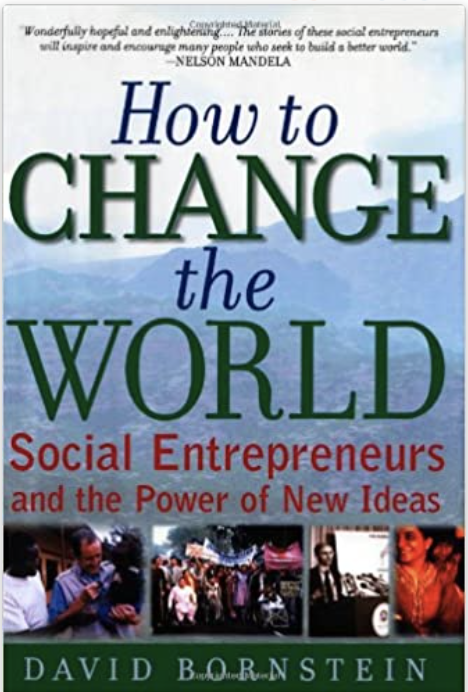The Challenges of "Great People" as a Model for Social Change - A Critical Review of "How to Change the World" by David Bornstein

Last summer, I finished reading David Bornstein’s book “How to Change the World: Social Entreprenuers and the Power of New Ideas”. The book is pretty neat, detailing the work of several “social entrepreneurs”, or talented people who work to solve social problems in their communities.
The book also details the non-profit organization Ashoka: Innovators for the Public and its founder Bill Drayton, who helped fund and advise these social entrepreneurs. The stories are compelling, fascinating, and inspiring tales of people overcoming obstacles to make large scale changes for the better.
What bothers me about the book, though, is while it’s called “How to Change the World”, it’s not actually a how-to book at all… at least not in any way that is immediately actionable or doesn’t involve doing a lot of reading between the lines. The key premise is that there are great people out there who have great ideas and can do great things if only we trust them and fund them.
But if you aren’t one of these great people – or worse yet, you have no idea how to find these great people and trust them and fund them – then you’re out of luck. While there’s a bit of confusion and mixed messaging throughout, the book seems to settle on the fact that not everyone can be a social entrepreneur. What are us everypeople supposed to do?
The Challenge of Selecting “Great People”
Ashoka is focused on finding “the Andrew Carnegie, Steve Jobs, and Henry Ford of the social change world” and giving them the funding and support they need to have a good idea. This kind of idea seems attractive to me – working in grant selection for Denison VPC, I know how important it has been to find people we can trust and who we can build relationships with. The idea of also finding people in the prime and pushing them over the edge to success reminds me a lot of angel investing. There’s a certain notion of romanticism in thinking about being the one little push that was needed to get Andrew Carnegie started.
Selection Criteria
But I’m really not sure how to connect this enchanting idea to the reality I’m in, and “move from here to there” so to speak. How do we find these great people, or tell great people apart from not-so-great people? As detailed in the book and on Ashoka’s website, there are selection criteria for identifying great people (and determining who gets the funding and support of Ashoka):
First, you need to be “possessed by a new idea — a new solution or approach to a social problem—that will change the pattern in a field”. Your idea also must be likely to “change the field significantly and that will trigger nationwide impact or, for smaller countries, broader regional change”. For example, Ashoka won’t fund building a school unless its part of a broader program to reform education.
…You also need to be “creative both as goal-setting visionaries and as problem solvers capable of engineering their visions into reality”.
…And the most important criterion, apparently, is entrepreneurial quality, which “defines leaders who see opportunities for change and innovation and devote themselves entirely to making that change happen”.
…Lastly, you have to be trusted absolutely and without doubt.
My Troubles
Ashoka has a good reputation as an organization, so I’m inclined to give it the benefit of the doubt. But I have to be honest in saying that this selection criteria doesn’t really help me.
There are a fair amount of trustworthy, creative, hard-working people out there, but I honestly don’t know if their ideas will work. How does Ashoka know if an idea will change the field significantly and trigger nationwide impact? Is it just a function of trusting the person, or is their idea evaluated on further criteria?
The book has detailed stories for nine people that Ashoka has supported, and they seem to have done good work for as far as I can tell. What’s missing for me, however, is the tale of the other 2109 fellows. Not that I expect 2109 stories in the book, of course.
What I do worry, however, is that the stories are cherry-picked. This is not to imply intentional (or even unintentional) deception on the part of Ashoka, but rather a question: once you pass Ashoka’s gauntlet, how likely are you to actually go on to high-impact activities? For me and as far as I can tell, this critical question remains unanswered. I’d be interested to see what stories of a randomly selected group of nine fellows would look like.
Another concern is best told by example: Sarah Palin frequently endorses candidates for Senator or Representative in various districts, who then go on to win the election. Palin then proudly announces that very few candidates manage to win without her endorsement.
But does this mean Palin’s endorsement causes success? Given that Palin always endorses the candidate who is leading in the race, this seems unlikely. Rather it’s the other way around – success (and shared values) cause a Sarah Palin endorsement. Thus another (as far as I can tell) unanswered question I have for Ashoka: how many successful Ashoka fellows wouldn’t have been nearly as successful if they hadn’t been picked by Ashoka?
The Challenge of Having a Great Idea
Again, Ashoka seems to be doing good, useful work. But given what I know about ideas – many “great ideas” have been tried that turned out not to work after all. In “The Donor Isn’t Always Right” I gave the example of the well-acclaimed PlayPumps. My co-blogger Kate Kloster points to TOMS shoes and similar initatives. GiveWell has documentation of many failures in education, job training, substance abuse programs (DARE), afterschool programs, etc.
The bottom line is that helping people is hard… especially when you’re looking for dramatic nation-changing large-scale high-impact work. It’s extraordinarily difficult to have a great idea that turns out to actually work. And it’s extraordinarily easy to look at an idea that looks great and seems to actually work, until it turns out that it doesn’t really.
I’d be willing to bet the folks at Ashoka are brilliant people, their fellows are brilliant people, and that they know what they’re doing. But I also know that having a nation-changing idea is hard, exceptionally harder than most people think, and very easy to underestimate. If I’m going to buy into Ashoka’s work and trust their trust of their fellows, I’d like a demonstration that their selection process does well.
-
Originally written 2013 August



